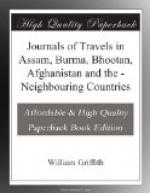23rd.—Ghuznee was taken this morning by a coup-de-main, the whole affair was over in half an hour from the time the gate was blown open; there was, however, a good deal of firing afterwards, and some of the inhabitants even held out throughout the day, and caused almost as much loss as that which occurred in the storm. The affair took place as follows: the guns moved into position between 12.5 and 2.5 P.M., and about 3 P.M. commenced firing at the defences over the gate: under cover of this fire the bags of powder, to the amount of 800 lbs. were placed against the gate by Captain Peat, the hose being fired by Lieut. Durand. In the mean time the road to the gate was occupied by the storming party, the advance of which was composed of the flank companies of all the European Regiments. The head of the advance was once driven back by a resolute party of Affghans, who fought desperately hand to hand, but a jam taking place, the check was only momentary. After clearing the gate, the enemy must have become paralysed, and both town and citadel were gained with an unprecedentedly trifling loss. None of the engineers, or of the party who placed the bags, were touched, although from the enemy burning blue lights they must have been seen distinctly: two, of a few Europeans who accompanied Capt. Peat were shot; one killed. During the day a great number of prisoners were taken, among whom was Dost Mahommud’s son; a great number of horses also fell into our hands.
24th.—Ghuznee: by this morning at 9 o’clock every thing was quiet, and the last holders-out have been taken; strict watch is kept at the gate to prevent plunder, dead horses are now dragged out, and dead men buried: the place looks desolate, but the inhabitants are beginning to return. It appears to me a very strong, though very irregular place, the stronger for being so: the streets are very narrow, and dirty enough, houses poor, some said to be good inside, it is a place of considerable size, perhaps one-third less than Candahar. It is surrounded by a wet ditch, of no great width, the walls are tall and strong, weakest on the north-east angle immediately under the citadel; parapets, etc. are in good repair. The loop holes are however absurd, and even when large are carefully screened. The ditch is crossed at the Cabul gate by a stone bridge. The Zuburjur is a very large gun, but almost useless to Affghans, who are no soldiers. Every side of the town might have been stoutly defended.
The view from the citadel is extensive and fine, the mountains to the north and north-west extremely so, and seem crowded in the view, while the river and its cultivation add novelty to an Affghan landscape; many villages are visible in every direction, surrounded with gardens and orchards.




